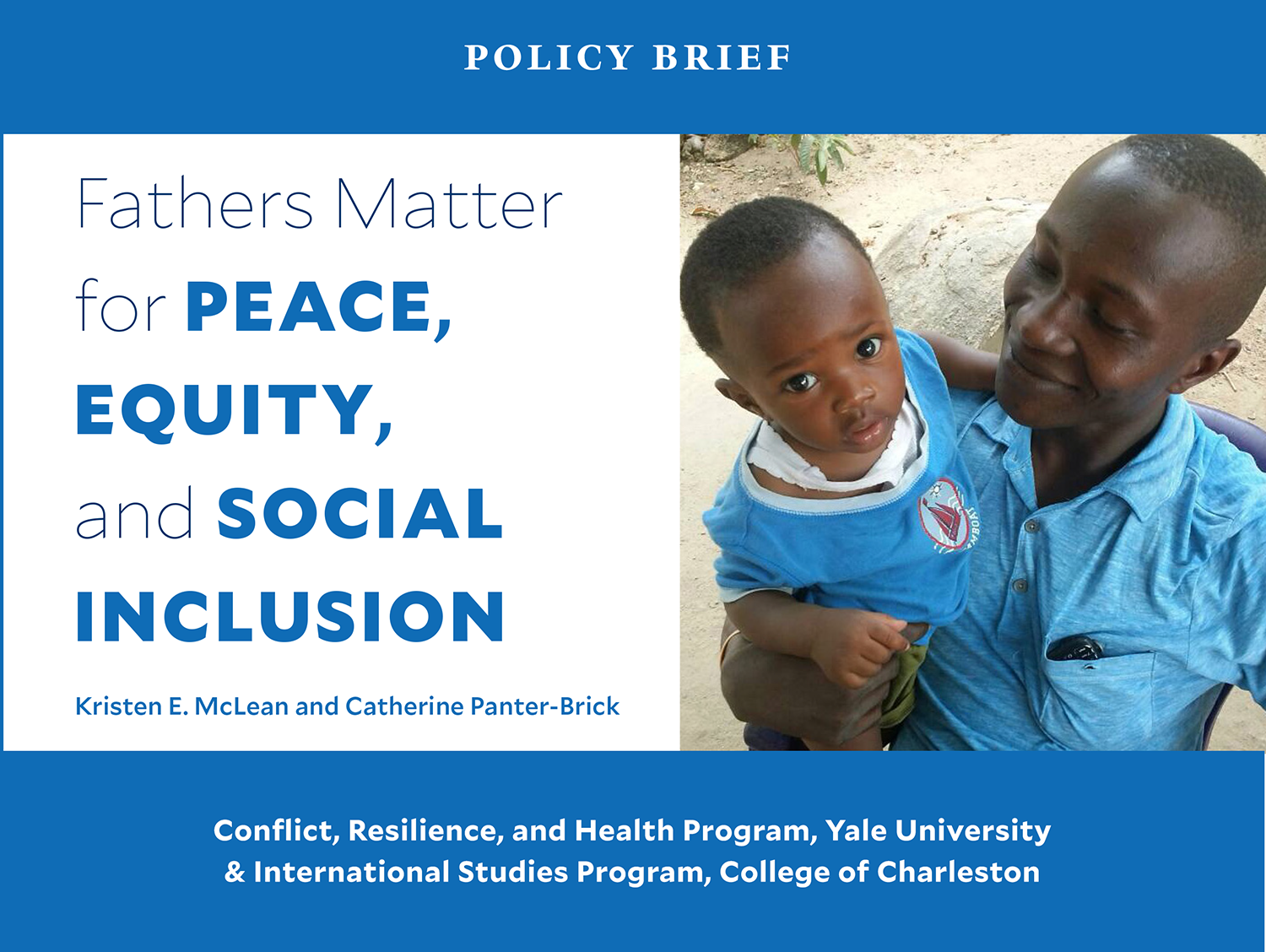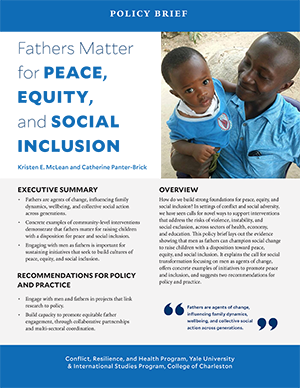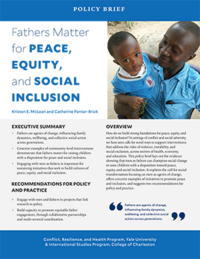Policy brief: Fathers matter for peace, equity, and social inclusion
Read the fully downloadable policy brief Fathers matter for peace, equity, and social inclusion, by Kristen E. McLean and Catherine Panter-Brick.
Executive Summary
- Fathers are agents of change, influencing family dynamics, wellbeing, and collective social action across generations.
- Concrete examples of community-level interventions demonstrate that fathers matter for raising children with a disposition for peace and social inclusion.
- Engaging with men as fathers is important for sustaining initiatives that seek to build cultures of peace, equity, and social inclusion.
- Engage with men and fathers in projects that link research to policy.
- Build capacity to promote equitable father engagement, through collaborative partnerships and multi-sectoral coordination.
Recommendations for policy and practice
- Engage with men and fathers in projects that link research to policy.
- Build capacity to promote equitable father engagement, through collaborative partnerships and multi-sectoral coordination.
Overview
A culture of peace and social inclusion
Global examples: Men and fathers as agents of change

Fathers are agents of change, influencing family dynamics, wellbeing, and collective social action across generations.
Turkey
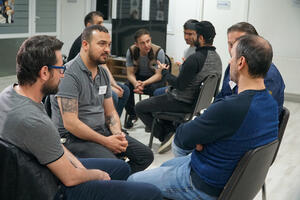
Lebanon
Jordan
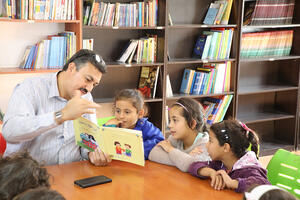 Locally designed in Amman, and diffused to over sixty countries of the world, We Love Reading (WLR) is a program focused on education and social entrepreneurship, training adult volunteers to become Reading Ambassadors and read aloud to children from the local community. This program aims to foster a love of reading and empowers people from marginalized communities to become agents of change. This initiative has won multiple international awards for social innovation and refugee education, and its impacts on children’s emotional competence, literacy, and attitudes towards reading are being rigorously evaluated.23 One component of impact evaluation research is currently focusing on Syrian refugee fathers, complementing a randomized trial with mother-child dyads, to build evidence for how fathers engage with their families during the COVID-19 pandemic.24
Locally designed in Amman, and diffused to over sixty countries of the world, We Love Reading (WLR) is a program focused on education and social entrepreneurship, training adult volunteers to become Reading Ambassadors and read aloud to children from the local community. This program aims to foster a love of reading and empowers people from marginalized communities to become agents of change. This initiative has won multiple international awards for social innovation and refugee education, and its impacts on children’s emotional competence, literacy, and attitudes towards reading are being rigorously evaluated.23 One component of impact evaluation research is currently focusing on Syrian refugee fathers, complementing a randomized trial with mother-child dyads, to build evidence for how fathers engage with their families during the COVID-19 pandemic.24Rwanda
Uganda
United States
Conclusion
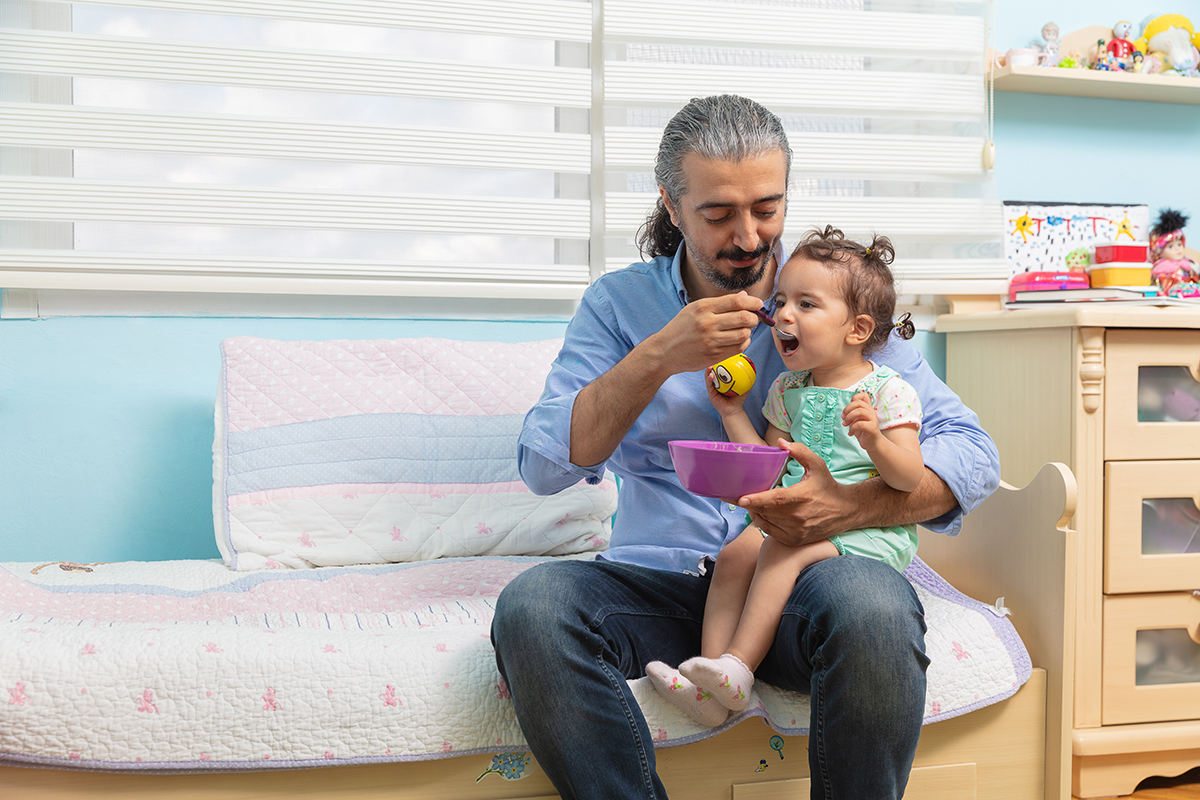
Scholars have called for relational approaches grounded in children’s social ecologies32 as well as the larger ‘community of care’7, to transcend some of the limitations of parenting intervention programs. Parenting programs that engage fathers effectively can help to foster not only healthy and more peaceful relationships within families, but also between diverse groups of men across society. Such programs can foster positive intergenerational effects by instilling in children the skills and impetus to engage in productive relationships across ethnic, religious, and cultural divides. The premise that fathers matter for peace, equity, and social inclusion has implications for research, practice, and policy. As Promundo, the international organization working to engage men in promoting gender equality and preventing violence recently stated, the Covid-19 pandemic provides a key moment for transforming gender norms and for encouraging fathers to become more engaged at home.33 There is an urgent need for governments and policy makers to prioritize father-engaged interventions to promote child and youth wellbeing, including social, cognitive, and physical development, by strengthening support and integrating relevant services (e.g. child welfare, education, health). For example, Fathers Incorporated has recommended building up father support services, including peer-to-peer networks that allow for male mentorship, educational opportunities to strengthen fathers’ life skills, and employment opportunities that allow men the space and time to engage in healthy relationships with their families.
Recommendations
- Engage with men and fathers in projects that link research to policy. Thus far, research demonstrates that interventions that engage fathers can have positive effects on family functioning, parental wellbeing, child development, peace, and community cohesion—and are particularly effective for families living in disadvantaged communities. Engaging and retaining the trust of men from underserved populations is thus particularly important to enlist their help in championing policies at the family and community-level. To best engage fathers, it is imperative that initiatives work inclusively with co-parents, at both cultural and structural levels, to ensure that initiatives are relevant to co-parenting concerns and to address issues of reach, cost, equity, trust, and sustainability.
-
Build capacity to promote equitable father engagement through collaborative partnerships and multi-sectoral coordination. To be successful, inclusive, and sustainable, interventions are best implemented as multi-sectoral intervention packages; it is naïve to think that, without larger structural interventions, targeted parenting programs can create more peaceful, just, and equitable societies.2 Successful community-level interventions have demonstrably fostered partnerships with state and civil society sectors; they tend to be most effective when partnerships are cultivated from the onset. One way to reach large numbers of families and children involves the development and diffusion of community-level agency, as shown in the example from Jordan. Another way is the formal integration of interventions into existing service platforms, such as poverty alleviation schemes, healthcare and nutrition services, and tuition free education programs. Specific efforts are needed to remove structural barriers to father involvement in such initiatives.
Photos from Jordan (WLR), Turkey (AÇEV) and Sierra Leone (Kristen E. McLean, top photo) reproduced with permission.
Endnotes
- Leckman, J.F., Panter-Brick, C., & Salah, R. (Eds.). (2014). Pathways to peace: The transformative power of families. MIT Press. .
- Leckman, J.F., Ponguta, L.A., Pavarini, G., Hein, S.D., McCarthy, M.F, Staiti, M.A.H., &…Panter-Brick, C. (2021). Love and peace across generations: Biobehavioral systems and global partnerships. Comprehensive Psychoneuroendocrinology, 8, Article 100092. doi.org/10.1016/j.cpnec.2021.100092.
- Clark, H., Coll-Seck, A. M., Banerjee, A., Peterson, S., Dalglish, S. L., Ameratunga, S., &…Costello, A. (2020). A future for the world’s children? A WHO-UNICEF-Lancet Commission. Lancet, 395(10224), 605-658. doi.org/10.1016/S0140-6736(19)32540-1.
- AÇEV 2009. Building a generation of reconciliation: The role of early childhood development in peace building. Mother Child Education Foundation Publications.
- Pettigrew, T.G., & Tropp, L.R. (2000). Does intergroup contact reduce prejudice? Recent meta-analytic findings. In S. Oskamp (Ed.), Reducing prejudice and discrimination (pp. 93-114). Lawrence Erlbaum Associates.
- Britto, P.R., Hanoz-Penney, S., Ponguta, L.A., Sunar, D., Issa, G., Hein S.D., &…Leckman, J.F. (2020). Pathways to a more peaceful and sustainable world: The transformative power of children in families. Development and Psychopathology, 16, 1-12. doi.org/10.1017/S0954579420000681.
- Panter-Brick, C., Burgess, A., Eggerman, M., McAllister, F., Pruett, K., & Leckman, J.F. (2014). Practitioner review: Engaging fathers – recommendations for a game change in parenting interventions based on a systematic review of the global evidence. The Journal of Child Psychology and Psychiatry, 55(11), 1187-212. doi.org/10.1111/jcpp.12280.
- Sadruddin, A.F.A., Ponguta, L.A., Zonderman, A.L., Wiley, K.S., Grimshaw, A., & Panter-Brick, C. (2019). How do grandparents influence child health and development? A systematic review. Social Science & Medicine, 239, Article 112476. doi.org/10.1016/j.socscimed.2019.112476.
- Seeds of Peace. (2022).
- McEvoy-Levy, S. (2011). Children, youth and peace building. In T. Matyók, J. Senehi, & S. Byrne (Eds.), Critical issues in peace and conflict studies: Theory, practice, and pedagogy (pp.159-176). Lexington Book.
- Panter-Brick, C. (2021). Resilience humanitarianism and peacebuilding. In M. Ungar (Ed.), Multisystemic resilience: Adaptation and transformation in contexts of change (pp.361-74). Oxford University Press.
- McLean, K.E. (2021). “Post-crisis masculinities” in Sierra Leone: Revisiting masculinity theory. Gender, Place & Culture, 28(6), 786-805. doi/full/10.1080/0966369X.2020.1825214.
- Ratele, K. (2015). Working through resistance in engaging boys and men towards gender equality and progressive masculinities. Culture, Health & Sexuality, 17(2), 144-158. doi.org/10.1080/13691058.2015.1048527.
- MenCare: A global fatherhood campaign. (2022).
- Fathers Incorporated. (2022).
- Lamb, M. E., & Lewis, C. (2013). Father-child relationships. In N.J. Cabrera, & C.S. Tamis-LeMonda (Eds.), Handbook of father involvement: multidisciplinary perspectives (pp. 119-134). Routlege.
- Fatherhood Institute. (2013). Fatherhood Institute research summary: Fathers’ impact on their children’s learning and achievement. Fatherhood Institute.
- Jeong, J., Siyal, S., Fink, G., McCoy, D.C., & Yousafzai, A.K. (2018). “His mind will work better with both of us”: A qualitative study on fathers’ roles and coparenting of young children in rural Pakistan. BMC Public Health, 18,Article 1274. doi.org/10.1186/s12889-018-6143-9.
- Mehus, C.J., Wieling, E., Achan, L., & Oloya, O.T. (2018). Identifying the roles of fathers in post-war northern Uganda: Groundwork for a parenting intervention. African Studies, 77(4), 526-548. doi/full/10.1080/00020184.2018.1496593.
- Gereš, N., Heilman, B., Hashimi, S. I., Kakar, R., Kelberg, M., Hakobyan, L., El Feki, S., & Barker, G. (2018). Reflections on gender, patriarchy, and peace: Results from the International Men and Gender Equality Survey (IMAGES) in Afghanistan. Promundo-US, UN Women, and Global Affairs Canada.
- Sunar, D., Kagitçibaşi, C., Leckman, J., Britto, P., Panter-Brick, C., Pruett, K., &… Sirali, Y. (2013). Is early childhood relevant to peacebuilding? Journal of Peacebuilding & Development, 8(3), 81-85. doi/10.1080/15423166.2013.865493.
- Hein, S., Bick, J., Issa, G., Aoude, L., Maalouf, C., Awar, A., &…Ponguta, L.A. (2020). Maternal perceptions of father involvement among refugee and disadvantaged families in Beirut, Lebanon. PLoS ONE, 15(3), Article e0229670. doi.org/10.1371/journal.pone.0229670.
- Michalek, J.E., Lisi, M., Awad, D., Hadfield, K., Mareschal, I., & Dajani, R. (2021). The effects of a reading-based intervention on emotion processing in children who have suffered early adversity and war related trauma. Frontiers in Psychology, 12, Article 613754. doi.org/10.3389/fpsyg.2021.613754.
- (FIERCE) Syrian Refugee Fathers Study. (2022).
- Betancourt, T.S., Jensen, S.K.G., Barnhart, D.A., Brennan, R.T., Murray, S.M., &…Kamurase, A. (2020). Promoting parent-child relationships and preventing violence via home-visiting: a pre-post cluster randomised trial among Rwandan families linked to social protection programmes. BMC Public Health, 20, Article 621. doi.org/10.1186/s12889-020-08693-7.
-
Jensen, S.K.G., Placencio-Castro, M., Murray, S.M, Brennan, R.T., Goshev, S., Farrar, J., &…Betancourt, T.S. (2021). Effect of a home-visiting parenting program to promote early childhood development and prevent violence: A cluster-randomized trial in Rwanda. BMJ Global Health, 6, Article e003508. doi:10.1136/ bmjgh-2020-003508.
- Ashburn, K., Kerner, B., Ojamuge, D., & Lundgren, R. (2017). Evaluation of the Responsible, Engaged, and Loving (REAL) Fathers Initiative on physical child punishment and intimate partner violence in Northern Uganda. Prevention Science, 18(7), 854–864. doi.org/10.1007/s11121-016-0713-9.
- Pruett, K., & Pruett, M. (2020). Engaging fathers of young children in low-income families to improve child and family outcomes: A preventive intervention perspective. In H. Fitzgerald, K. von Klitzing, N. Cabrera, J. Scarano de Mendonca, & T. Skjothaung (Eds.), Handbook of fathers and child development: Prenatal to preschool (pp. 627–638). Springer.
- Pruett, M.K., Cowan, P.A., Cowan, C.P., Gillette, P., & Pruett, K.D. (2019). Supporting father involvement: An intervention with community and child welfare–referred couples. Family Relations, 68(1), 51–67. doi/10.1111/fare.12352.
- Pruett, M. K., Pruett, K. D., Cowan, C. P., & Cowan, P.A. (2017). Enhancing paternal engagement in a coparenting paradigm. Child Development Perspectives, 11(4), 245–250. doi.org/10.1111/cdep.12239.
- Casey, P., Cowan, P. A., Cowan, C. P., Draper, L., Mwamba, N., & Hewison, D. (2017). Parents as partners: A U.K. trial of a U.S. couples-based parenting intervention for at-risk low-income families. Family Process, 56(3), 589–606. doi.org/10.1111/famp.12289.
- Vindevogel, S. (2017). Resilience in the context of war: A critical analysis of contemporary conceptions and interventions to promote resilience among war-affected children and their surroundings. Peace and Conflict, 23(1), 76-84. doi.org/10.1037/pac0000214.
- Ruxton, S., & Burrell, S.R. (2020). Masculinities and COVID-19: Making the connections. Promundo-US.
Citation: McLean, K.E., & Panter-Brick, C. (2022). Fathers Matter for Peace, Equity, and Social Inclusion. Policy Brief. Conflict Resilience and Health Program, Yale University & International Studies Program, College of Charleston. https://ecdpeace.org/policy-brief-fathers-matter-peace-equity-and-social….
JOIN THE CONVERSATION
For breaking news and to stay connected, follow us on social media. Sign up to get our E-News delivered straight to your inbox.


